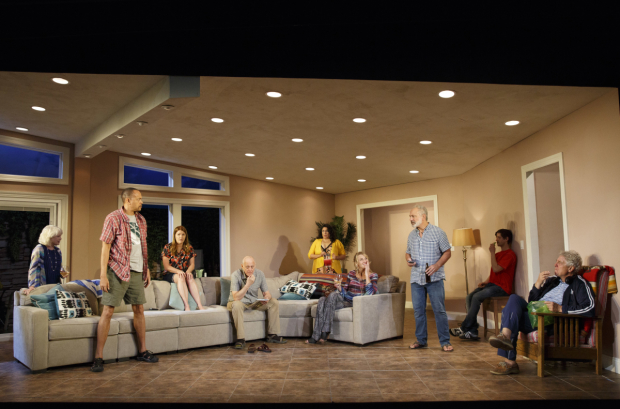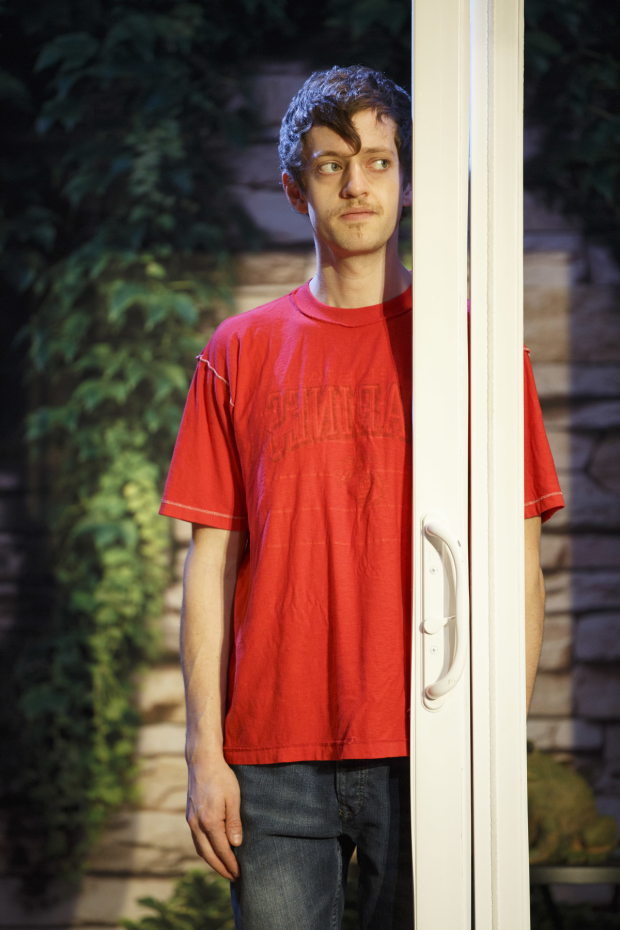Rancho Viejo

(© Joan Marcus)
"I have measured out my life with coffee spoons," writes T.S. Eliot in his poem "The Love Song of J. Alfred Prufrock." Exploring similar themes of bourgeois purposelessness 100 years later in his new play, Rancho Viejo, Dan LeFranc might replace coffee spoons with wine stems. This simultaneously stylish and frustrating show is now making its world premiere at Playwrights Horizons. While some viewers will undoubtedly hail the play as a brilliant encapsulation of the human condition, even more are likely walk away feeling like their time has been wasted.
The play (all three hours of it) takes place in the fictional suburb of Rancho Viejo (the design suggests Southern California). Pete (Mark Blum) and Mary (Mare Winningham) visit their friends Patti (Julia Duffy) and Gary (Mark Zeisler), who live in a home that looks exactly like theirs. So do their neighbors, Leon (Tyrone Mitchell Henderson) and Suzanne (Lusia Strus). So do Mike (Bill Buell) and Anita (Ruth Aguilar). Are you humming the song "Little Boxes" yet?

(© Joan Marcus)
Unlike the worker bees of Levittown (currently under the microscope in The Babylon Line), these folks live in rather larger boxes with gorgeous patios and giant sectional sofas (Dane Laffrey designs one set to depict every McMansion). No one seems to work, so their lives are an endless stream of wine-swilling barbecues at which lurking millennial Tate (an appropriately creepy Ethan Dubin) is the youngest and most interesting guest. Over the course of three acts, we learn of their predictable dramas through stilted conversation: Pete is obsessed with the failing marriage of Patti and Gary's son, Richie. Suzanne has an eye condition. Mike met Anita on a trip to Guatemala and everyone struggles to communicate with her in broken Spanish. None of these things seem particularly important in LeFranc's coolly detached presentation.
In his program note, Playwrights Horizons artistic director Tim Sanford compares LeFranc's work to Samuel Beckett's Waiting for Godot. If that is a play in which nothing happens twice, it appears in triplicate here. Thankfully, everyone in the cast excels at making this a watchable three-act nothing, endowing their lines with color and subtext. This is an essential skill when performing a play like this, especially if one wants the audience to stay awake.
The hilarious Zeisler seems to particularly relish playing the aging surfer Gary, a man who refers to everyone as "muchacho" or "duder." Strus is delightfully abrasive as the salty Suzanne, while Duffy easily inhabits over-the-hill sex kitten Patti. The two women have a great subplot about being rival real estate agents.
Unfortunately, director Daniel Aukin is never able to fully resolve the problem of a script that is sarcastically self-aware while also calling for realistic performances. Blum never feels completely committed to his character's peculiar obsessions, even when he leans into them in his performance. "No! No! I can't… I never would have suspected! Never! Wow wow," he exclaims after Gary and Patti insinuate that Richie's wife cheated on him. We have to laugh at how over-the-top his response is to the marital problems of people he barely knows.

(© Joan Marcus)
By contrast, the more restrained Winningham is disarmingly sincere as Mary. Nothing in her delivery feels forced. When she asserts that art can change lives, we know that she believes that. Sadly, everyone in the room dismisses her with a crushing Californian indifference. At least New Yorkers have the decency to scream in your face that you're wrong.
Jessica Pabst outfits everyone for perpetual vacation: Shorts and floral prints abound. Marti the dog plays Suzanne and Leon's dog Mochi in a show-stealing performance (typically great work by animal trainer Bill Berloni). When Mochi goes missing in the third act, Pete sets out on a quest to find her (but really, to find himself). He explains what he learned:
I feel like I've been on one of those television shows we all like to watch…where there's a man…a uh well usually a white man…very much like myself…but handsomer…a man who suffers some kind of pain…trauma…and thus…eventually…has an awakening of some kind…which leads him on a journey…a journey towards…towards truth.
We laugh because we've just seen what that journey really was: A random series of events signifying nothing.

(© Joan Marcus)
Rancho Viejo is just one of a recent string of plays that point out the inherent meaningless of our existence (Adam Bock's A Life, which just ended its run at Playwrights Horizons' upstairs theater, tells this story much more forcefully and in 90 fewer minutes). LeFranc's low-stakes dialogue, coupled with the sarcastic high-stakes delivery of the actors, gives the impression that we're watching something astutely transgressive. We chuckle at the inane conversations of these pampered Californian suburbanites from the distance of midtown Manhattan, secure in the knowledge that we're in on the joke. It all feels fashionable, sophisticated, and incredibly safe.
Mary is right: Art can change the world, but only if the artist actually tries. With Rancho Viejo, LeFranc doesn't try to change anything; he merely reflects a depressing reality. In doing so, he easily clears the low bar he sets for himself, but we still leave the theater wanting more.











